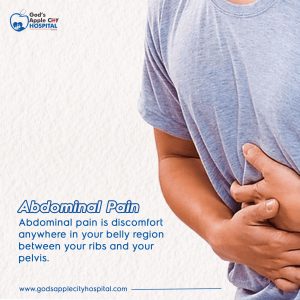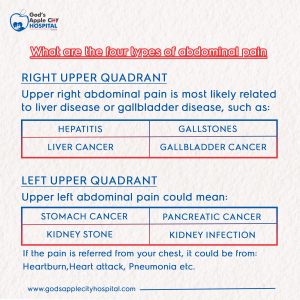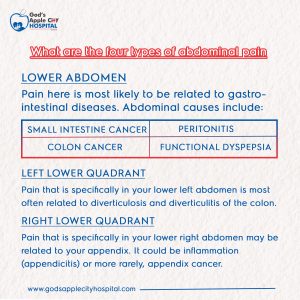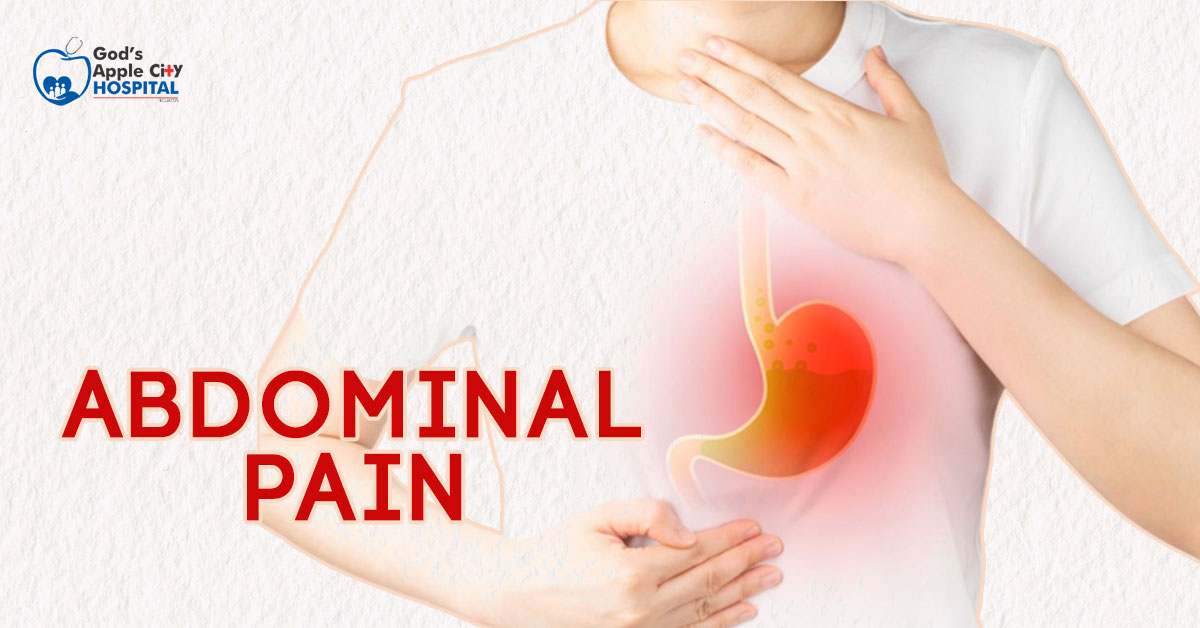Abdominal pain is discomfort anywhere in your belly region between your ribs and your pelvis. We often think of abdominal pain as “stomach pain” or a “stomachache,” but pain in your abdomen could be coming from other organs too.
Your abdomen is home to your:
- Stomach.
- Liver.
- Gallbladder.
- Pancreas.
- Small intestine.
- Large intestine.
These are all organs in your digestive system, but pain can also be in your abdominal wall, the outer shell (skin, muscles) of your abdomen. And sometimes, the pain that you feel in your belly may be coming from somewhere else, like your chest, pelvis or back.

Abdominal pain can take many forms and can mean many things.
It may feel:
- Mild or severe.
- Dull or sharp.
- Burning or achy.
- Crampy or colicky.
- Constant or intermittent.
- Localized (in one spot) or generalized (all over).
Ultimately, abdominal pain is a subjective symptom that only you can describe. Since your healthcare provider can’t measure it, it’s what you say it is. Your healthcare provider will always take your abdominal pain seriously.
How common is stomach pain?
Just about everybody will experience abdominal pain at some point. Most of the time, it’s not serious and resolves by itself. However, it can be a sign of serious illness or even an emergency. Abdominal pain causes 5% of emergency room visits.
What are the four types of abdominal pain?
Since your abdomen it is home to many organs, your healthcare provider may want to narrow down the kind of pain you’re having by narrowing down the region you’re feeling it in. Healthcare providers often divide the abdomen into quadrants or four parts. They may ask if your pain is in the:
- Right upper quadrant.
- Left upper quadrant.
- Right lower quadrant.
- Left lower quadrant.
What does abdominal pain location tell you?
Location is an important clue to your abdominal pain, though it’s not the only factor. It may indicate which organs are involved. For example, pain in the upper right quadrant may indicate a problem with your liver or gallbladder.
However, your healthcare provider will also want to know more about what your pain feels like, how often you feel it, and how severe it is. This will give them additional clues about what kind of condition you may have.

Why does my stomach hurt?
There are numerous reasons for abdominal pain. It may be related to digestion, injury, infection or disease. It may come from an organ inside, or from the muscles or skin in your abdominal wall. Or it may have spread from somewhere else nearby.
Your healthcare provider will ask you detailed questions about your pain to determine the cause. How bad it feels doesn’t necessarily indicate how serious it is. Some common, transient conditions can be intense, and some life-threatening conditions may feel mild.
What are the most common causes of abdominal pain?
Most causes are temporary and not serious. They may have to do with digestion, menstruation or a passing virus. For example:
Digestive issues
Abdominal pain after eating may be due to:
- Indigestion.
- Gas and gas pain.
- Constipation.
- Diarrhea.
- Food allergies and intolerances.
- Food poisoning.
Inflammation
Irritation or infection in your organs can cause temporary inflammation, such as:
- Viral gastroenteritis (stomach flu).
- Peptic ulcer disease.
- Chronic acid reflux (GERD).
- Urinary tract infection (UTI).
Female reproductive cycle
If you have a uterus, you might experience occasional pain from:
- Menstrual cramps.
- Ovulation pain.
What are the more serious causes of abdominal pain?
Sometimes abdominal pain indicates a serious medical condition that will require treatment. Pain in different regions may indicate different organs are involved. For example:
Right upper quadrant
Your upper right abdomen is home to your liver, gallbladder and bile ducts. Your right kidney is in the back. The first sections of your small and large intestines also pass through.
Upper right abdominal pain is most likely related to liver disease or gallbladder disease, such as:
- Hepatitis (alcoholic, toxic, metabolic, viral or autoimmune).
- Gallstones.
- Cholecystitis (gallbladder inflammation).
- Bile duct cancer, stones and strictures.
- Gallbladder cancer.
- Liver cancer.
It could also be a localized problem in your duodenum, ascending colon or right kidney, such as a:
- Kidney infection.
- Kidney stone.
- Duodenal ulcer.
- Large bowel obstruction.
Left upper quadrant
Your upper left abdomen is home to your stomach, pancreas and spleen. Your left kidney is in the back of your abdominal cavity, and your heart and left lung are right above it.
Upper left abdominal pain could mean:
- Pancreatitis (inflamed pancreas).
- Pancreatic cancer.
- Splenomegaly (enlarged spleen).
- Gastritis.
- Stomach ulcer.
- Bile reflux.
- Stomach cancer.
- Kidney infection.
- Kidney stone.
If the pain is referred from your chest, it could be from:
- Heartburn.
- Angina.
- Noncardiac chest pain.
- Heart attack.
- Pericarditis.
- Pneumonia.
- Pleurisy.
- Pulmonary embolism.

Lower abdomen
Your lower abdomen has most of your small intestine and large intestine. Pain here is most likely to be related to gastrointestinal diseases. It could also be related to your ureters, ovaries or uterus.
Abdominal causes include:
- Irritable bowel syndrome.
- Functional dyspepsia.
- Inflammatory bowel disease (Crohn’s, ulcerative colitis).
- Large or small bowel obstruction.
- Small intestine cancer.
- Colon cancer.
- Abdominal aortic aneurysm.
- Peritonitis.
- Mesenteric lymphadenitis.
- Intestinal (mesenteric) ischemic syndrome.
- Hernia.
- Kidney stones.
Pain referred from the pelvic organs could be due to:
- Endometriosis.
- Ovarian cysts.
- Pelvic inflammatory disease.
- Ectopic pregnancy.
- Ovarian cancer.
- Uterine cancer.
Left lower quadrant
Pain that is specifically in your lower left abdomen is most often related to diverticulosis and diverticulitis of the colon. Diverticula (small outpouchings in the bowel wall) can occur throughout your colon, but they usually develop in the lower left part.
Right lower quadrant
Pain that is specifically in your lower right abdomen may be related to your appendix. It could be inflammation (appendicitis) or more rarely, appendix cancer.

General pain
Other, general causes of stomach pain include:
- Stress (psychosomatic pain).
- Visceral hypersensitivity.
- Abdominal bloating.
- Traumatic injuries.
- Muscle strain.
- Shingles.
How is abdominal pain diagnosed?
Your healthcare provider will ask you detailed questions about your pain. They’ll want to know:
- Where you feel it.
- What it feels like.
- How long you’ve had it.
- If it comes and goes.
- If it’s getting worse.
- If it stays in one place or moves.
- What makes it better or worse.
- What other symptoms you have.
From your answers, your healthcare provider will try to determine if you need emergency treatment. Sometimes your healthcare provider will be able to tell right away that your pain is temporary and not serious. Sometimes they may suspect a more serious condition and may want to run some tests. And sometimes they won’t be able to solve the mystery on the first visit. Your pain may subside, or you may have to return for further investigation.
How do you relieve abdominal pain?
Stomach pain has a wide variety of causes and treatments. Some conditions, such as gallstones or appendicitis, may require surgery. Others, such as ulcers or infections, may be eased with medicine. And sometimes you may just have to get through a bout of stomach flu or a kidney stone until it passes.
If you don’t know what’s causing your abdominal pain, it’s important to find out, especially if it doesn’t go away on its own. Remember that even mild cases can be serious. However, if you have a pretty good idea that your stomachache is related to digestion, you can begin by treating yourself with:
- Bowel rest. Stop eating, or only eat easy-to-digest foods like crackers or bananas.
- Hydration. Drink plenty of water or a hydration formula.
- Heat therapy. Try a warm water bottle or a soak in the bath.
- Home remedies. Try licorice for gas, ginger for indigestion, or peppermint to help relax your intestinal muscles.
When should I see my healthcare provider about my abdominal pain?
Always see your doctor if your pain is unexplained, persistent or severe, or if you have been injured or are pregnant.
Also, see your doctor if your pain is accompanied by any of these symptoms:
- Persistent fever.
- Persistent nausea or vomiting.
- Blood in your stools, urine or vomit.
- Swelling and tenderness to the touch.
- Jaundice (yellowing of the eyes and skin).
- Pain in any other part of your body.
- Shortness of breath or symptoms that get worse with exertion.

How can I prevent abdominal pain?
Not all forms of abdominal pain are preventable. But you can minimize the risk of developing abdominal pain by:
- eating a healthy diet
- drinking lots of water
- exercising regularly
- eating smaller meals.
.
.
.
.
.
.
.
.
.
.
.
.
.
.
.
.
.
.
.
.
.
.
.
.
Kindly Check us out on
Facebook @ godsapple.hospital
Instagram @ godsapplecityhospital
Click on the link below to read other posts:

